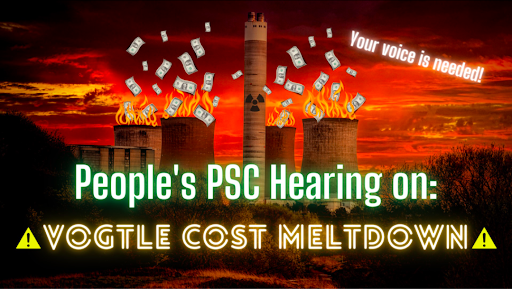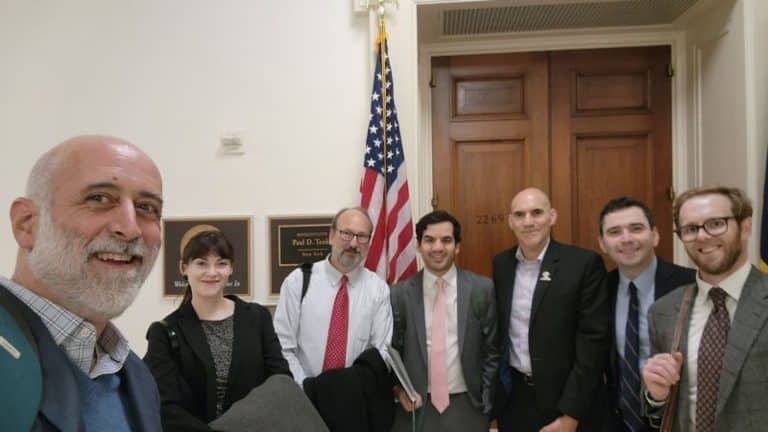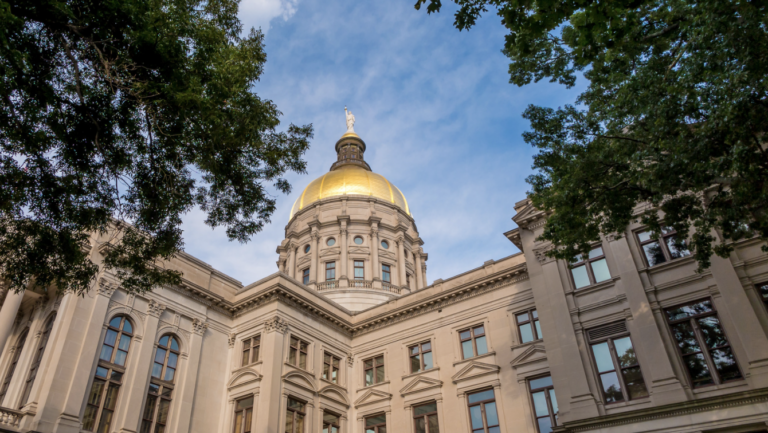Brady Watson, former Civic Engagement Coordinator for the Southern Alliance for Clean Energy, also contributed to this blog post.
On the evening of Thursday, October 7, groups including the Southern Alliance for Clean Energy (SACE), Georgia Conservation Voters, Georgia Beyond Coal, We the Plug Tho, Environment Georgia, and the Sierra Club Georgia Chapter hosted a People’s Public Service Commission (PSC) Hearing.
Nearly 30 participants joined the event, which was organized in response to the Georgia PSC’s decision to nix the public comment period from its hearing on October 14. Watch the morning hearing and the afternoon session. The issue presented at the October 14 hearing was Georgia Power’s request to raise customers’ rates in order to pay for the first batch of costs associated with the Unit 3 expansion of the years -delayed and billions-over-budget Plant Vogtle nuclear plant, or the Vogtle Cost Meltdown, as organizers of the event have been referring to the situation.

[button color=”blue” url=”https://cleanenergy.org/news-and-resources/georgia-peoples-public-service-commission-psc-hearing/”]Watch the event recording [/button]
Georgia Power is the only for-profit utility company in the state, and amongst other duties, the Georgia PSC is tasked with overseeing utility ratemaking. It should be noted the PSC is composed of five elected commissioners, and voters can vote in each of the five districts, no matter where they live.
Breaking Down the Vogtle Cost Meltdown
The organizers and participants at last week’s People’s PSC Hearing’ shared a common concern: Georgia Power must pass the costs of its ever-increasing overruns at Plant Vogtle onto ratepayers in an equitable manner and in a way that does not overburden low-income customers who are already struggling to pay their bills.
The PSC first approved an expansion of the Vogtle plant in 2009, with the expectation that Unit 3 would be online by 2016, and Unit 4 by 2017. At the time, the total cost of the expansion was estimated at $14 billion. At present, the cost of the Unit 3 and Unit 4 Vogtle expansion has doubled to $28 billion, and neither Unit is yet online. Georgia Power is managing construction though it only owns 45.7% of the project. The PSC previously determined it would be “reasonable” for Georgia Power to spend up to $7.3 billion for its share of the project, but its costs are already approaching $9 billion.
The current Georgia Power proposal is to raise its customer’s rates by $302 million a year. This will enable Georgia Power to recover the first $2.1 billion of its capital costs to date. In other words, this is only the first rate increase; it won’t be the last or only one.
The proposal is to apply that rate increase equally across all base tariffs. But, as Wan Smith with Georgia Conservation Voters said, “equal is not equitable.” That point is illustrated in the fact that residential customers have already paid far more for this project than industrial customers.
By the end of 2020, Georgia Power had already collected $3.5 billion from customers through a Nuclear Construction Cost Recovery (NCCR) fee. Thus far the cost contributions can be broken down as:
- Residential customers have paid 47% or $1.66 billion
- Industrial customers have paid 11%, or$401 million
- Commercial customers have paid 40% or $1.39 billion
Bringing Power to People’s Voices
As the public was not allowed at this week’s hearing, and only emailed written comments were allowed, the video comments from this People’s PSC Hearing serve as an alternative opportunity the Georgia Power customers have with the Commission on the pending decision to increase customers’ rates to pay for Vogtle Unit 3. With such a monumental decision being made, we believe that the public must be heard and therefore the comments collected at the People’s PSC hearing were assembled for the Commission.
The public comment portion of the event began with Wykeisha How, who expressed concern for her ability to pay for the needs of her eight children as her electricity bill continues to increase, “My power bill skyrocketed and I can barely afford to pay for food and basic needs. I can’t afford a $200 bill every month. I just got a disconnection notice. The pandemic is hard on us. I live in an energy burden community and I’m gonna be watching and telling all my neighbors what you are doing.”
Linda Clark, a single mother said that while she had enough income for herself and her daughter, “I still have to help others because we’re still in this together. I’m looking to retire, and want to go into a lower income bracket, and maintain a high quality of living. I don’t want to have to go to the grocery store and make choices about food. Power is a basic necessity.”
Myke McFarland from Austell, Georgia understood the outrage of the most vulnerable customers who significantly impacted by the proposed rate hike and that, “They’re allowing them (Georgia Power) to profit from bad business. Tom Fanning (the Georgia Power CEO) made $28 million in compensation, 500 times the average pay of workers in Georgia. I’m talking to Tim (Echols) and Bubba (McDonald) who have been on the (Georgia Public Service Commission) longest, and are Christian. It’s not a Christian thing to cut people off during the middle of a pandemic. Not fair to take their mistakes on costs out of the ratepayers, they should take it out of their profits and compensation.”
KaCey Venning, a nonprofit small business owner serving people who are just scraping by said, “corporations need to be good citizens. They should reconsider, there are real people on the other side of your decision. One small change in their budget can make a big difference.”
Phil Wolstenholme, who worked in the nuclear power industry 30-40 years ago, stated, “We must look out for the public interest. People responsible should bear the financial burden rather than consumers, especially not people who are unable to afford it. The PSC should be looking out for the public.”
Dr. Dawn Cason from Powder Springs said that it was, “Important for the PSC to hear from the public. None of us as customers had any choice with the nuclear plant, or the expansion, or the charges. Georgia Power should spread out costs to commercial and industrial, as well as residential. Not fair for us to have to pay for overages. Whoever is responsible should have to pay for overages.”
Barbara Joye, a former employee with the Consumer Utilities Council in the 1980s which was a state-funded group that supported PSC staff in rate-making said she, “Came in knowing nothing, and grew very frustrated. They don’t care about consumers, especially residential ones. Plant Vogtle was a stupid investment. Can you imagine what we could’ve done with that money?! Weatherized every home, added sustainable energy. Anything you can do to lower rates would be extremely helpful. I’m 78, and probably won’t be around to see the plant finished. It’s just a disgrace.”
Bette Holland from Dawsonville, Georgia and who works with the North Georgia Conservation Association continued to voice others’ concerns over the fairness of cost distribution, “Costs inevitably go to Georgia Power customers, many are low-income who cannot afford increases. Not fair when CEOs and shareholders are making tons of money, they can pay. Low to middle-income residents should not ever have to pay for any more rate increases.”
Christine Baker asserted, “I feel like the company is responsible for the extra costs. That should be on the mind of decision-makers. They should not be allowed to make profits for executives or shareholders. If certain customers paid more than others, they should receive a rebate. Conversely, those customers that did not pay much relative to their income, they should pay more.”
What’s Next
In late January 2022, Georgia Power is expected to propose its next Integrated Resource Plan (IRP), or energy resource plan, that will include a period for public comment. The IRP released every three years will lay out the utility’s plans for generating power for the next 20 years and plans to pay for infrastructure updates amongst other costs. Here’s hoping it will be improved over the last IRP.
Expected to be included in the IRP is another issue the PSC and Georgia Power will have to contend with: clean-up of toxic coal ash expected to cost up to $8 billion.
Additionally, we expect another rate case with Georgia Power in 2022, which will include rates for everything but those related to Vogtle rate adjustments.
We agree with others at the People’s PSC Hearing: Georgia Power should be investing in more clean and affordable solar energy without having to worry about the environmental concerns of fossil fuel power.
Stay tuned for more updates on Plant Vogtle, Georgia Power, the Georgia PSC, and how you can stay involved.


